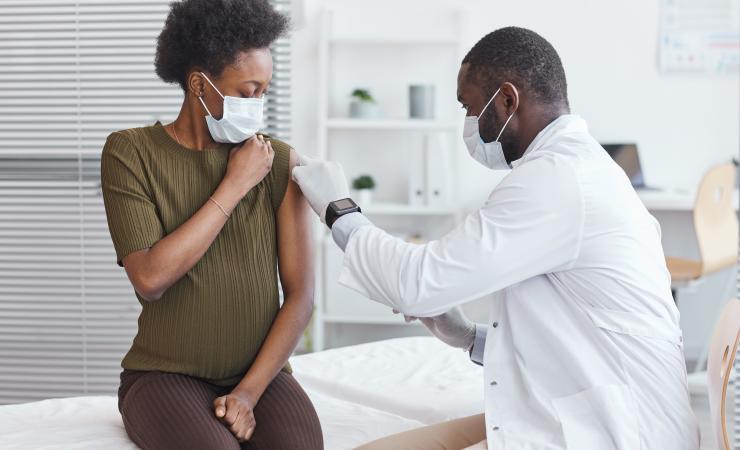Whooping cough, or pertussis, is highly contagious and extremely dangerous for infants under a year old. The most effective way to prevent pertussis is through vaccination. Although more than 86% of all children globally receive pertussis vaccines, cases of whooping cough have been rising in many countries worldwide, leading to hospitalisations and deaths. This is why there is a pressing need for increased research into pertussis and existing vaccine regimens – so that improvements can be made and deaths can be prevented.
Around the world, various vaccine regimens against pertussis are in use. Some vaccines involve modified or inactivated parts of the pertussis bacteria (often called acellular vaccines) whereas others are made from whole-cell pertussis bacteria.
Regardless of the vaccine used, full protection against pertussis requires several vaccine doses, which means that very young babies who have yet to receive all their doses remain vulnerable. This risk has been significantly reduced in countries where pregnant women are routinely vaccinated against pertussis, because pregnant women can pass antibodies against pertussis to their unborn children.
However, some studies have also shown that the mother’s antibodies can affect the infant’s own immune response to their pertussis vaccines, an effect known as ‘blunting’. The clinical significance of these findings is unclear.
In the Gambia, pregnant women do not routinely receive a pertussis vaccine, and infants are generally vaccinated with the whole-cell pertussis vaccine. The Gambian Pertussis Study (GaPs) was a phase 4 randomised controlled trial which compared several different vaccine regimens, set up by the PERISCOPE project. The idea was to assess not only the magnitude, but also the quality and persistence of the infant’s immune response to pertussis, using assays developed by the project.
Pregnant women were assigned either a pertussis/tetanus combination vaccine, or a tetanus-only vaccine. After their babies were born, the infants began to receive one of two different types of pertussis vaccines – whole-cell and acellular – and researchers compared their immune responses to the vaccines.
At 8 weeks of age (i.e., before their first dose of the vaccines) infants born to mothers vaccinated with the pertussis/tetanus vaccine had – unsurprisingly – significantly higher anti-pertussis antibodies than those born to mothers vaccinated against tetanus only.
After the first round of vaccinations, babies whose mothers had received the pertussis/tetanus vaccine during pregnancy had lower levels of certain antibodies in their blood. Studies carried out in Europe beforehand had shown the same thing.
The extent of this effect varied depending on which vaccine the infants received – it was much more pronounced when babies were given a whole-cell pertussis vaccine compared to those who received an acellular pertussis vaccine. In whole-cell vaccinated infants whose mothers had received the pertussis vaccine in pregnancy, the concentration of antibodies against the pertussis toxin was more than eight-fold lower than in infants born to mothers who received the tetanus-only vaccination.
Despite this blunting, the quality of antibodies generated by whole-cell vaccinated infants remained similar to – or in many cases higher than – acellular-vaccinated infants. Most importantly, antibody levels and vaccine memory (measured by B-memory cells) remained high in all infants, suggesting good protection against the disease.
Overall, the study demonstrated that when mothers took the anti-tetanus jab during pregnancy and their babies received the whole-cell pertussis vaccination schedule (which is the current standard of care in The Gambia), the infants had the highest levels of anti-pertussis antibodies.
Whether or not these differences in immune responses affect a baby’s risk of getting pertussis later on is not yet clear, and requires further larger studies taking the epidemiological context into account.
The Gambian Pertussis Study (GaPs) is the first study to provide comprehensive immunological data comparing vaccine regimes in pregnancy and infancy, and the first to do this in sub-Saharan Africa where data are limited.
By looking at antibody quality, function and quantity, the study provides useful insights into antibody-mediated protection which can inform the design of even better pertussis vaccines.
“This clinical trial conducted in Africa was a unique opportunity to demonstrate that the use of a pertussis vaccine in pregnancy is perfectly safe and results in excellent antibody concentrations that can protect vulnerable newborns,” said Beate Kampmann of Charité – Universitätsmedizin Berlin, who led the study.
“Furthermore, given the design, we also confirmed that not all pertussis vaccines are equal when it comes to the immune responses induced in the infants, once they receive their own vaccines – and only a randomised controlled design would have given us the depth of information on not only quantity but also quality of antibody."
She highlighted that the public-private partnership and the funding available through the Innovative Medicines Initiative allowed the researchers to develop new assays together with their partners.
"The rich information derived from these well-controlled assays will pave the way to comprehensively assess any newly developed pertussis vaccines, as they could be benchmarked though our collaborations and additionally compared across the additional trials and projects of the PERISCOPE consortium,” she said.
The results of this study were published in the Lancet Infectious Diseases.
PERISCOPE is supported by the Innovative Medicines Initiative, a partnership between the European Union and the European pharmaceutical industry.
